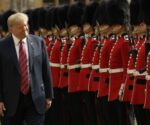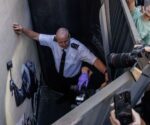NIH Director Bhattacharya: “The First Amendment Was Effectively A Dead Letter During The Pandemic”
NIH Director Dr. Jay Bhattacharya spoke at the National Conservatism Conference in Washington, DC:
NIH DIRECTOR BHATTACHARYA: I thought I’d talk to you about the fact that science needs free speech. Especially given who was on the panel before, with this amazing speech by Secretary Gabbard and then Mike Benz, you already have an introduction to some of the problems I’m going to talk about. But I want to highlight why they’re important by starting-at the risk of causing you some shell shock-by thinking back a few years to 2021, or maybe even to 2020. The pandemic is raging. All of the scientific evidence that you are hearing on the news says that you have to close the schools, you have to close the churches, you’re not allowed to go to Thanksgiving dinner with your family, you have to not visit your dying loved ones in the hospital, you have to wear a mask. When the vaccine comes, they tell you that you have to take the vaccine because if you don’t, you’re going to spread it to your friends and you’re going to die. Remember the winter of discontent, where the unvaccinated were the enemy of the nation in 2021. The question is: where were the scientists? If you ask yourself why there wasn’t so much dissent-or why you didn’t hear much dissent-the fact is that there was a lot among my scientist friends. There were a lot of diverse opinions. But the problem was that the scientific debate you deserved to hear in 2020 and 2021-you were denied, because the free speech guarantees that this country normally has were taken away. The First Amendment did not exist during the pandemic. The First Amendment was effectively a dead letter during the pandemic. I’m going to tell you my story in a little bit. I’ll end with a sad note, and I’ll tell you up front: the First Amendment still doesn’t apply in the United States. It still doesn’t apply. Although the administration has made great strides, committing to make sure that free speech rights are upheld, right now the free speech rights are based primarily on the guarantees by the administration for free speech rather than on a firm legal basis of the First Amendment protecting our free speech rights. Okay. Let me start by talking about what happened to me during the pandemic, just to set the stage. In October of 2020, I wrote a document called the Great Barrington Declaration. The idea of the Great Barrington Declaration was that schools should not have been closed, that young people had a very, very low risk of dying from COVID, and older people had a much higher risk of dying from the first wave of COVID-a very steep age gradient in the mortality risk of COVID. The obvious implication-obvious at the time to me, to many scientists, and probably to most of you in the room-was that we should protect older people better, and then for younger people, let them do their thing: let them go to school, let them be young people, because the risk of the lockdowns was certain to be more harmful to them than COVID. In fact, that’s the reality now: all of the learning loss we’ve seen, the huge amount of depression, the surge we saw for years in suicidality and drug overdoses-all can be traced back to those fateful decisions in late 2020, when the epidemiological evidence was ignored. To write the Great Barrington Declaration-I’m quite proud of it-but it’s the least original thing I ever wrote in my entire life. Honestly, it was the old pandemic plan. Protect older people better; don’t harm young people. Makes sense, right? Almost a million people signed the document when we put it online. The question in my mind was: why is this such a big deal? It seems obvious. The reason it was a big deal was that even though there was a massive scientific debate going on at the time, no one was allowed to say it. It had this frisson of shock when people saw it, because they came to the realization they weren’t alone. Unlike scientists, most regular people had a sense that we were doing something terribly wrong, and the Great Barrington Declaration essentially gave permission to say and think the thing you think. This is before the big censorship apparatus really started taking hold. You’ve heard Mike Benz talk about the censorship apparatus. In the fall of 2020, the way things worked, the Great Barrington Declaration actually got out; almost a million people signed it within a couple of weeks. I had this superstitious belief that if exactly a million people signed it, we would end the pandemic immediately. We’re still not quite at a million, so if you want to sign it, you can go do that. But within days, Google delisted it. There were Wikipedia/media hit pieces on it, calling it a dangerous fringe idea. The former head of the National Institutes of Health-which is the agency I’m currently in charge of-wrote an email asking Tony Fauci to deliver a devastating takedown of the premise of the declaration, using ad hominem attacks on me. The whole thing was surreal. The idea was that the scientific community wanted to tell you there was no debate. Only fringe figures would believe something as outrageous as protecting older people better. Fast-forward to 2021. President Biden comes into power in January 2021, and one of the first things he does is to deputize every single aspect of the federal government to censor speech at scale. The first real hint I got of this was in March 2021. I was on a panel invited by Governor Ron DeSantis in Florida. I was very nervous, not used to political situations-I’m still not; I’m a professor at heart. The panel was on masking children. I prepared for this: I looked up all of the studies that asked whether masking toddlers as young as two years old had any effect whatsoever on transmission of diseases during the pandemic. You can probably guess the answer. How many of you think there’s a single randomized study-a good randomized study-saying that masking toddlers was the key to solving the pandemic? Not one. And certainly no good non-randomized studies. I told the governor this-the most obvious thing in the history of obvious things. That video of me telling the governor there is no randomized evidence in favor of masking toddlers-I’m still processing the idea that we masked toddlers-was censored by YouTube almost immediately. A few months later, I decided I was going to join Twitter. Why did I join Twitter? I’d spent my career telling my students not to join Twitter, because the way you make a big difference in life is by publishing scientific papers and quietly watching your ideas take over the world. I was naive. I decided to join Twitter to tell people about the Great Barrington Declaration. When Elon Musk bought Twitter a couple of years later, it turned out that the day I joined Twitter, in August 2021, I had been placed on a blacklist. I found this out because Elon Musk invited me to Twitter headquarters, and I saw with my own eyes the database with my face on it and the word blacklist written over it. Why would I be put on a blacklist by Twitter? Why would a private company decide to put me on a blacklist, when their business is made by people communicating ideas with each other? It turns out the government essentially forced them to do it. The way they did it was insidious. A few months later, I was invited by the Missouri Attorney General and others in the Missouri v. Biden case that reached the Supreme Court. I was one of the plaintiffs, as was Martin Kulldorff-another author of the Great Barrington Declaration-and others who had been censored during the pandemic. In depositions of people like Tony Fauci and Rob Flaherty in the White House, we found a pattern: the White House using its power-an all-of-government approach-the State Department, the White House, the CDC, every single agency, going to social media companies and telling them, If you don’t censor, we’re going to destroy you, backed up by President Biden excoriating the CEOs of these social media companies, saying they were killing people if they didn’t stop misinformation. The way they did it was clever. They funded academic organizations, including at my old university, Stanford, with grants from the National Science Foundation, telling them to research who was spreading misinformation on themes suggested to them. The academic organizations would go to the social media companies and say, Look at these themes spreading on your platform. It was a censorship-laundering campaign, using universities to give social media companies carte blanche to censor, while from the other side the White House was threatening to destroy the companies unless they censored. It was incredibly effective. If your posts got taken down or you were banned on Twitter, you were subject to the same censoring campaign. The strategy worked because it created the impression that if you disagreed with the government’s scientific ideas, there was something wrong with you. Just to give you a sense of how Orwellian this is: when the CDC announced in April 2021 that the Johnson & Johnson vaccine had certain side effects and paused it, Facebook-having adopted algorithms because of White House pressure-tagged the Biden White House as an anti-vax group and suppressed its spread. There are fantastic emails of the White House writing to Facebook saying, Why are you censoring us? And the answer was: because they’d asked them to. Censorship knows no bounds; it always comes back to bite you. In the lower courts, the case was fantastic. They looked at the body of evidence and found that the government was acting like Al Capone going to companies-social media companies-saying, That’s a really nice company you have there; it would be a shame if something were to happen to it. The district court judges called it an Orwellian device. When it reached the Supreme Court, I was absolutely convinced-I’m an immigrant to this country, a naturalized citizen, with reverence for the First Amendment-that the Court would see it. But in the preliminary injunction, which forced the administration to stop censoring, the Supreme Court said that I did not have standing to sue, nor did any of my co-plaintiffs, because there wasn’t a single email from the White House to the social media companies saying, Censor Jay. Instead, there was a broad pattern of pressure to adopt algorithms so that ideas would be suppressed-not any single person, but the ideas themselves. I promised I’d end with bad news, so let me do that-and a bit of good news first. When President Trump won, one of the first executive orders he put in place was to restore free speech in this country. He stopped and ended the whole apparatus of censorship, and it’s still being taken apart. The NIH played a role; we’ve cut a lot of the academic laundering of censorship. But the apparatus was taken apart by executive order of the president on January 20, 2025. What the Supreme Court ruled was that I didn’t have standing to sue. The reasoning was that the government ought to be able to go to The New York Times and tell them, Don’t publish that story about troop movements-you’re going to harm national security. Think about that. In that case, the government is using its speech to tell The New York Times not to publish, and The Times can do what it wants, knowing the government’s position. In the new censorship regime we currently live under, the government can tell other people to censor ideas, and as long as they don’t name any single individual, no one will have standing to sue. The First Amendment in that sense is a dead letter-an unenforceable dead letter. So we have to realize we are at a very perilous moment. At this point, the only thing protecting free speech in this country is, frankly, President Trump. If we’re going to make a long-lasting difference for free speech rights, we need legislation that makes the First Amendment enforceable, that standing actually exists. If the government comes after you-or just your ideas-you should have a right, just like The New York Times would, to tell the government to take a flying leap: I want to say what I want to say, and go away. That’s the key to the American spirit. The stakes are tremendously high. The title of my speech is that science requires free speech. You can’t have science without free speech, and the scientific basis for so much of our lives depends on people being able to argue with each other and with scientists openly and freely, without fearing attacks on our right to talk, as happened during the pandemic. I’ll end with a call to action. This is fixable if we understand what’s happening. Senator Schmidt, I know, is working on legislation to restore First Amendment rights. We need acknowledgment that if your free speech rights are violated by the government, you ought to have the ability to sue, the ability to find out what they’re doing, and have the courts force the government to stop. Because as much as I love him, President Trump will not be in power forever, and I don’t want the next president to take those free speech rights from me-or from you-in future governments.









